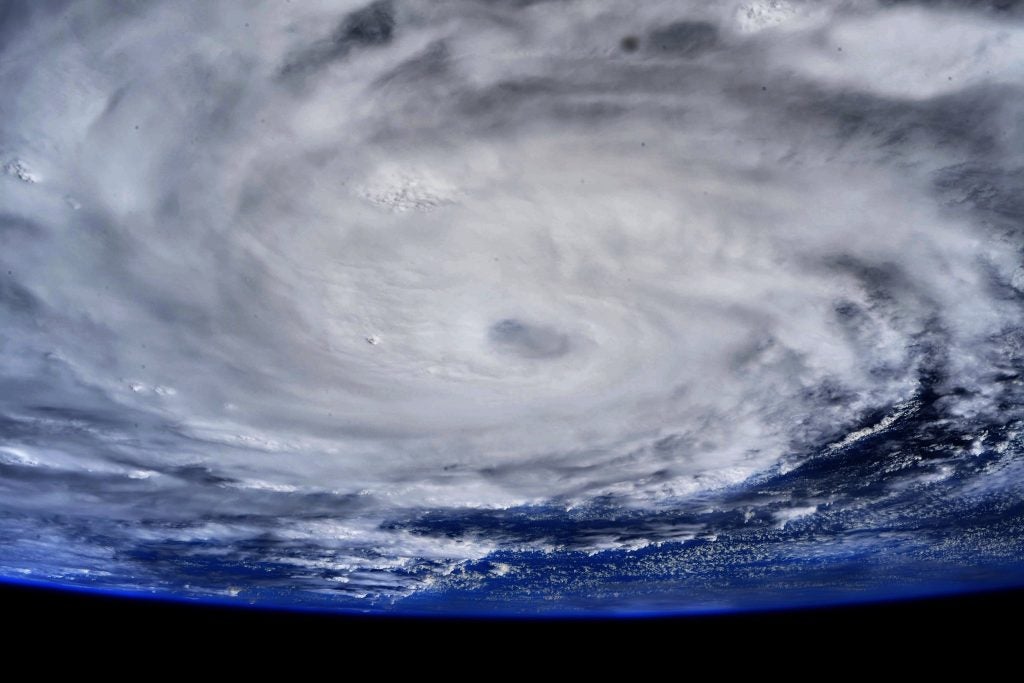Hurricane experts available to explain storm behavior, potential impacts
Scientists keep close watch on hurricane activity
Aug 3, 2020 - by David Hosansky
Aug 3, 2020 - by David Hosansky

Hurricane Hanna in the Gulf of Mexico on July 26, as seen from the International Space Station. (Photo by Bob Behnken, NASA/International Space Station.)
As hurricane season starts to peak, scientists at the National Center for Atmospheric Research (NCAR) and its managing organization, the University Corporation for Atmospheric Research (UCAR), are closely watching tropical storm activity and the potential for strong winds, torrential rains, and widespread flooding.
Hurricane experts are available to explain issues such as:
Antonio Busalacchi, UCAR president (for interview requests, please contact David Hosansky)
Busalacchi, an expert on ocean-atmosphere interactions, has testified before Congress on the importance of improving the nation's weather, climate, and water forecasting capabilities. As a part-time New Orleans resident, he has firsthand experience with the impacts of powerful hurricanes.
Josh Alland, NCAR postdoctoral fellow, jalland@ucar.edu
Alland specializes in how hurricanes undergo intensity change, ranging from weakening storms to rapidly intensifying hurricanes. He also focuses on how evacuation decisions are made when high-impact hurricanes are threatening coastal communities.
Cindy Bruyère, NCAR scientist, bruyerec@ucar.edu
Bruyère works with the insurance and reinsurance industries to understand how climate change and variability impact hurricanes on decadal time scales. She has also studied the impact of surge due to landfalling hurricanes.
Dereka Carroll-Smith, NCAR visiting scientist/NIST PREP postdoctoral associate, dcarroll@ucar.edu
Carroll-Smith focuses on hurricane impacts and hazards, specializing in societal impacts on underrepresented communities. She also studies the predictability of tornadoes that are spawned from hurricanes and affect inland areas.
Christopher Davis, director, NCAR Mesoscale and Microscale Meteorology Laboratory, cdavis@ucar.edu
One of the world's leading tropical cyclone researchers, Davis studies the weather systems that lead to hurricanes and other major rainfall events. His expertise includes hurricane prediction and how computer models can be improved to better forecast storms.
James Done, NCAR scientist, done@ucar.edu
Done works with the insurance industry to better understand hurricane impacts. He also focuses on seasonal predictions of hurricane damage and the potential influence of climate change on the storms.
David Gochis, NCAR scientist, gochis@ucar.edu
An expert in hydrometeorology, Gochis studies the causes of floods and how to better predict them. He helped develop pioneering software that is at the core of the National Water Model, which is used by the National Oceanic and Atmospheric Administration Office of Water Prediction for detailed streamflow and flood forecasts.
Terry Hock, NCAR engineer, hock@ucar.edu, 303-497-8767
Hock is an electrical engineer and one of the world's leaders in dropsonde technology. Originally developed at NCAR, dropsondes are specialized instrument packages that are released into hurricanes from overflying aircraft, providing critical measurements of atmospheric conditions within the storm and improving forecasts of hurricane track and intensity.
Falko Judt, NCAR scientist, fjudt@ucar.edu
Judt specializes in the complex and often subtle factors that can cause a hurricane to rapidly intensify or to lose strength. He is evaluating the next generation of weather models to determine how well they can forecast hurricanes.
Matthew Kelsch, UCAR hydrometeorologist, kelsch@ucar.edu
Kelsch has studied some of the biggest U.S. flood events connected to hurricanes and tropical storms. He trains scientists and forecasters from around the world on emerging hydrology and weather topics.
Wen-Chau Lee, NCAR scientist, wenchau@ucar.edu
Lee is a meteorologist who specializes in using radars to observe severe storms. A veteran of aircraft flights into hurricanes, he is leading the development of a powerful new instrument, the Airborne Phased Array Radar, which will advance understanding of the structure and behavior of hurricanes by capturing highly detailed, 3D views of the atmospheric conditions in and around the storms.
Rebecca Morss, NCAR scientist, morss@ucar.edu
Morss is an expert in the predictability of hurricane-related hazards, including storm surge and inland flooding, as well as hurricane and flood risk communication and evacuation decision making.
Laura Read, NCAR scientist, lread@ucar.edu
Read is a water resources engineer whose primary focus is on water management, water resource systems modeling, and analyzing flood risk and climate change. She is on the development team for the NOAA National Water Model.
Rosimar Ríos-Berríos, NCAR scientist, rberrios@ucar.edu
Ríos-Berríos is an expert in heavy precipitation associated with hurricanes and the reasons that certain storms undergo rapid intensification. A native of Puerto Rico who closely followed the intensification and impacts of Hurricane Maria, she is available for interviews in both English and Spanish.
Jeff Weber, UCAR meteorologist, jweber@ucar.edu
As a specialist in hurricanes and severe weather in general, Weber closely monitors the behavior of individual storms and the larger atmospheric and oceanic conditions that influence them.